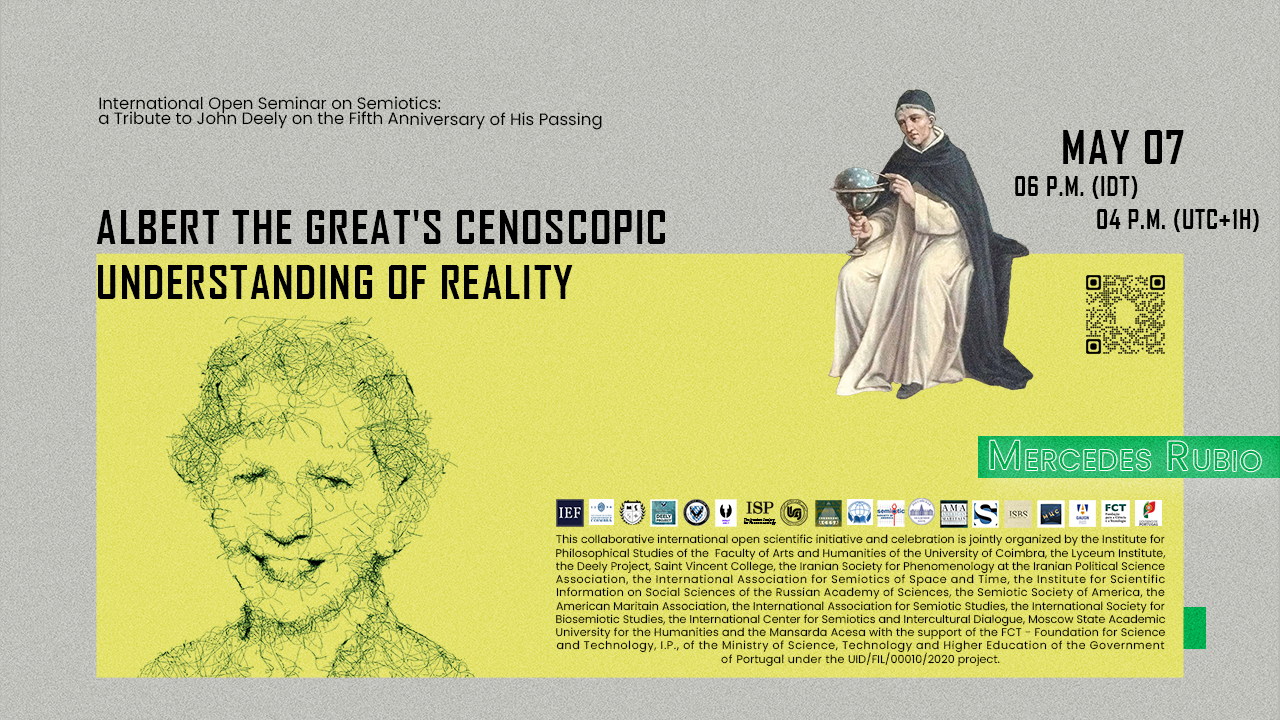Albert the Great’s Cenoscopic Understanding of Reality (May 7)
Face it as a learner… and refine the fundamentals of reasoning over reality with the father of the natural sciences.

ZOOM: IO2S ⚘ Albert the Great’s Cenoscopic Understanding of Reality
Lecturer: Mercedes Rubio
Commentator: Gyula Klima
Chair: Yulia Nikitenko
Meeting room: https://zoom.us/j/96939916767
Stream link: https://youtu.be/G4koWyqOhps
Mercedes Rubio is a Research Associate at the University of Navarra (Spain). She recently joined the Leonardo Polo Institute of Philosophy in Chicago (USA), besides being a member of the International Association for Semiotic Studies and the Societé Internationale pour l’Étude de la Philosophie Médiévale (SIEPM). She graduated in Humanities (Philosophy Department) from the University of Navarra and wrote her MA Thesis on The Knowledge of God according to Albert the Great, which was later published in the Series Cuadernos de Anuario Filosófico. She obtained the Diplome Européen d’Études Médiévales (Brussels SIEPM – Rome La Sapienza) and holds a PhD degree from the Hebrew University of Jerusalem. Her publications cover a wide range of topics in Greek, Latin and Hebrew Philosophy, with particular attention to the fields of theory of knowledge, philosophy of language and semiotics. Her Doctoral dissertation, Aquinas and Maimonides on the Possibility of the Knowledge of God, won the Shlomo Pines Prize (2002) and was later published in the Series “Amsterdam Studies in Jewish Thought.” She has published other studies on Aristotle, Albert the Great, Thomas Aquinas, St. Augustine, Averroes, and Abraham Bar Hiyya. Among her contributions to the study of semiotics, cf “Aristotle, Augustine and Aquinas on the Nature of Signs,” in „Homo – Natura – Mundus: Human Beings and Their Relationships“. Proceedings of the XIV International Congress of the Société Internationale pour l’Étude de la Philosophie Médiévale. Ed. R. Hofmeister Pich, A. C. Storck, A. S. Culleton (Brepols: Turnhout 2020) 477-488.
Gyula Klima is Professor of Philosophy at Fordham University, New York, Director of the Center for the History of Ideas of the Institute of Hungarian Research, Budapest, Hungary, Doctor of the Hungarian Academy of Sciences, Founding Director of the Society for the European History of Ideas, Founding Director of the Society for Medieval Logic and Metaphysics and Editor of its Proceedings, as well as an editor of the Stanford Encyclopedia of Philosophy and of a book series at Fordham, Medieval Philosophy: Texts and Studies, and at Springer, Historical-Analytical Studies on Nature, Mind and Action. Before taking up his position at Fordham, he had taught philosophy in the US at Yale and Notre Dame, prior to which he had done research in Europe at the universities of Budapest, Helsinki, St. Andrews, and Copenhagen. His publications, besides more than a hundred scholarly papers, include Questions on the Soul by John Buridan and Others: A Companion to John Buridan’s Philosophy of Mind (Springer, 2017), Intentionality, Cognition and Mental Representation in Medieval Philosophy (Fordham University Press, 2015), John Buridan (Oxford University Press, 2008), John Buridan: Summulae de Dialectica, an annotated translation with a philosophical introduction (Yale University Press, 2001); ARS ARTIUM: Essays in Philosophical Semantics, Medieval and Modern (Institute of Philosophy of the Hungarian Academy of Sciences, 1988).
Homepage: https://www.uc.pt/fluc/uidief/io2s
Auditorium: https://www.uc.pt/fluc/uidief/io2s/auditorium
This event is part of the 2022 International Open Seminar on Semiotics: a Tribute to John Deely on the Fifth Anniversary of His Passing, cooperatively organized by the Institute for Philosophical Studies of the Faculty of Arts and Humanities of the University of Coimbra, the Lyceum Institute, the Deely Project, Saint Vincent College, the Iranian Society for Phenomenology at the Iranian Political Science Association, the International Association for Semiotics of Space and Time, the Institute for Scientific Information on Social Sciences of the Russian Academy of Sciences, the Semiotic Society of America, the American Maritain Association, the International Association for Semiotic Studies, the International Society for Biosemiotic Studies, the International Center for Semiotics and Intercultural Dialogue, Moscow State Academic University for the Humanities and the Mansarda Acesa with the support of the FCT – Foundation for Science and Technology, I.P., of the Ministry of Science, Technology and Higher Education of the Government of Portugal under the UID/FIL/00010/2020 project.
Image designed by Zahra Soltani.

Leave a Reply
You must be logged in to post a comment.